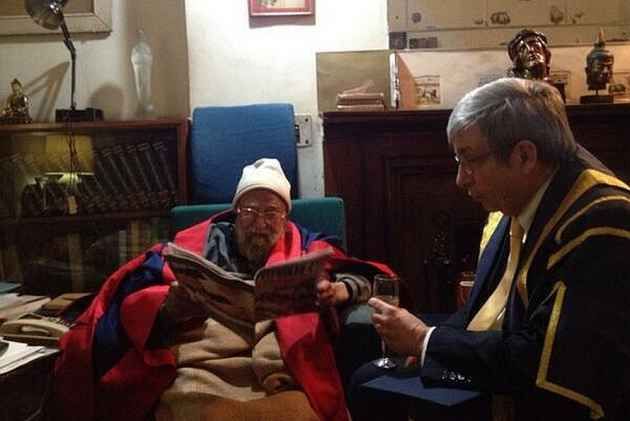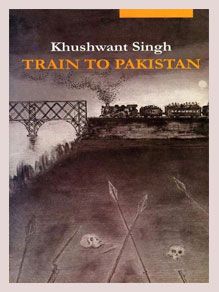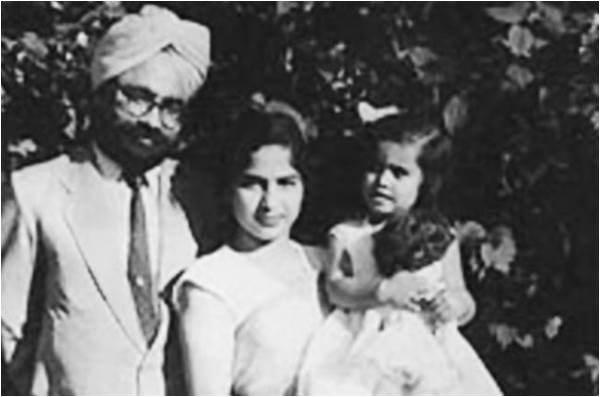Khushwant Singh
Sep 03, 2019 • 396 views
Indian Author Khushwant Singh was indeed a man of history! He has been a lawyer, diplomat, journalist and editor. He was born Hadali, Khushab district, Pakistan to a Sikh family as the younger son of Sir Sobha Singh and Veeran Bai. He lived in Delhi's first apartment complex 'Sujan Singh Park' located in Khan Market, Delhi, built by his father and named after his grandfather.

He seems to be born on 2 February 1915. But guess what? That is made up by his father!
In Khushwant Singh's time, this whole significance of birth dates and death dates, was nearly non-existent.
But at the time of his admission in school, Modern School, Delhi, Singh's father had to get something done for the records of the school! Thus, 2 February!
Birth
Khushwant's grandmother Lakshmi Bai, however, was quite assertive that he was born in the month of August. Hence, later on he arbitrarily changed the birth date to 15 August. Days of birth couldn't be a big deal for them!
Singh's actual name was Khushal Singh initially. He was called by a pet name called 'Shalee'.
Certainly, the fellows at his school would mutter
" Shalee Shooli, Bagh di Mooli! " which meant to call Khushal the 'radish' of a garden'!
Khushwant later changed his name to what it is, so that it rhymed with his brother's name-- Bhagwant Singh.
Education and qualification
He completed a chunk of higher education from Government College, Lahore. He studied law from the prestigious St. Stephen's College, Delhi and King's College, Cambridge University, London.
Career
He started his career as a practicing lawyer at the Lahore, Court for about 8 years.
After the partition, in 1947, he started working as an Information Officer in the Indian Foreign Services, Toronto, Canada and worked diplomatic relations.
Later on, he worked in for 4 years London and Ottawa for the Indian High Commission as Press attaché and Public Officer.
Around 1954, he worked as a Journalist for the All India Radio.
Well, it isn't over yet! He also worked in the Department of Mass Communications in UNESCO in Paris, France.
He was the founder and editor of an Indian government journal called Yojana. Later he was an editor of the Indian Newspapers- The Hindustan Times and The National Herald.
Political Participation and Influence
He initially showed an inclination towards the Indian National Congress, especially during the time of former Indian Prime Minister, Indira Gandhi.
His support to the Congress got a little bumped after the Anti-Sikh Riots, closely before Indira Gandhi's Assassination. The Congress leaders were allegedly involved in this national disturbance.
However, on the grounds of his promise for Indian Democracy, he worked via the Citizens Justice Committee.
Khushwant was also honoured with the Padma Bhushan, in 1974. He certainly returned the award in protest of the siege of the Golden Temple during Operation Blue Star (3 Jun 1984 – 8 Jun 1984), Harvindar Sahib, Amritsar, Punjab, India.
Khushwant had great diplomatic relations with Israel.
He was also a member of the Rajya Sabha.
Religion
Khushwant, was seemingly an atheist. He didn't encourage divided and categorical religion.
Read his book: Agnostic Khushwant (2011) in which he openly expresses that he believes there is no God.
He explains, "One can be a saintly person without believing in God and a detestable villain believing in him. In my personalised religion, There Is No God!"
He has also said, "I don't believe in rebirth or in reincarnation, in the day of judgement or in heaven or hell. I accept the finality of death."
He was a diplomat and unapologetic. This is what characterises his acclaim!
Do read his book, The Good, The Bad and The Ridiculous which came out in October, 2013. This was his last book. It was his critique of religion and its practice in India.
Awards and Honours
Padma Vibhushan 2007
Padma Bhushan (returned in 1984 after Operation Blue Star)
"Honest Man of the Year Award" by Sulabh International Social Service
Organization in July 2000
Punjab Rattan Award (2006)
Sahitya Academy Fellowship Award by Sahitya Akademi of India in 2010
Order of Khalsa (Nishaan-e-Khalsa)
Lifetime Achievement Award of Tata Literature Live! The Mumbai Litfest in 2013
Fellowship of King's College London in 2014
Most Acclaimed Book- Overview
TRAIN TO PAKISTAN
Khushwant Singh was born much before the India-Pakistan Partition. He has seen it all from scratch.
He drives the readers through the nuances and smaller details that outline the lives of people before all this happened and during the time that it was happening and how it influenced not only people, but their families, generations and their core values.
Train to Pakistan, is of course, a story of fiction. However the underlying messages are indeed real and derived from facts.
This novel, was rather an outlet of Singh's nostalgia of real incidences.
The book also conveys the fact that" Both sides were killed, both shot and stabbed and speared and clubbed. Both tortured. Both raped."

Book Cover
Source: Geeta Chhabra
It gives an account of the Mano Majra, a village on the border of India and Pakistan. It also weaves in a little love story of a Muslim Girl and a Sikh 'Village gangster'. During the course of the book, there's a battle that is being fought, a battlefield that's being prepared and a train that arrives...that carries bodies, rather corpses.
It's about and upto Juggut Singh, the protagonist, that he reclaims peace for his village.
Works of Khushwant Singh
The Mark of Vishnu and Other Stories, (Short Story) 1950
The History of Sikhs, 1953
Train to Pakistan, (Novel) 1956
The Voice of God and Other Stories, (Short Story) 1957
I Shall Not Hear the Nightingale, (Novel) 1959
The Sikhs Today, 1959
The Fall of the Kingdom of the Punjab, 1962
A History of the Sikhs, 1963
Ranjit Singh: Maharaja of the Punjab, 1963
Ghadar 1915: India's first armed revolution, 1966
A History of the Sikhs, 1966 (2nd edition)
A Bride for the Sahib and Other Stories, (Short Story) 1967
Black Jasmine, (Short Story) 1971
Tragedy of Punjab'"
The Collected Stories of Khushwant Singh, N.p., Ravi Dayal Publisher, 1989
Delhi: A Novel, (Novel) 1990
Not a Nice Man to Know: The Best of Khushwant Singh, 1993
We Indians, 1993
Women and Men in My Life, 1995
Declaring Love in Four Languages, by Khushwant Singh and Sharda Kaushik, 1997
India: An Introduction, by Khushwant Singh
The Company of Women, (Novel) 1999
Truth, Love and a Little Malice (an autobiography), 2002
With Malice towards One and All
The End of India, 2003
Burial at the Sea, 2004
Paradise and Other Stories, 2004
A History of the Sikhs: 1469–1838, 2004
Death at My Doorstep, 2005
A History of the Sikhs: 1839–2004, 2005
The Illustrated History of the Sikhs, 2006
Why I Supported the Emergency: Essays and Profiles, 2009
The Sunset Club, (Novel) 2010
Gods and Godmen of India, 2012
He published his first story “The Mark of Vishnu” in 1948.
Well, he's had a long list of works- from Novels ranging from Fiction and Non-Fiction short stories and plays. What is mentioned above is merely a speck!
Family
Khushwant was married to Kawal Malik. They were childhood friends. Later they met again at the King's College at Cambridge where they were studying Law. His wife deceased in 2001.
They have a son, Rahul Singh and a daughter, Mala.
Actor Saif Ali Khan's former wife, Actress Amrita Singh, was the daughter of Khushwant's brother Daljit Singh's son, Shavinder Singh.
Khushwant's Grandniece Tisca Chopra is a well-known television and film actress.

Leftmost: Khushwant Singh
Source: The Canadian Bazar
Death
Singh died on 20th March 2014, at 6:00 in Delhi at the age of 99. He was cremated at 4 at the Lodhi Crematorium, on the same day.
Some of his ashes were brought and scattered in Hadali, Punjab Province of modern Pakistan.
